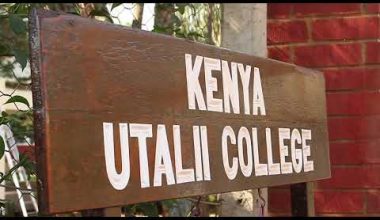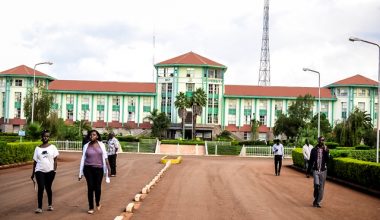Jomo Kenyatta University of Agriculture and Technology (JKUAT) is arguably one of the best universities in Africa. Webometrics recently ranked it the second-best university in Kenya for delivering excellent, top-notch academic services.
JKUAT is more than just the best Engineering university in Kenya. It offers over 100 standard courses to equip students with the skills needed in a competitive global market.
This post on JKUAT courses breaks down all the courses available at JKUAT, the qualifications you need to get admitted, and the school fees for this year. You will get all the necessary info you need if you want to kickstart your Agriculture and Technology in JKUAT.
Table of contents
- Which County is JKUAT Located in Kenya?
- Does JKUAT offer Nursing?
- Is JKUAT a Public or Private University?
- How Many Students Does JKUAT Have?
- What Are The Courses Offered at JKUAT?
- JKUAT Courses and Fee Structure
- How To Pay for JKUAT School Fees
- What Is the Entry Requirement for JKUAT?
- Frequently Asked Questions
- Conclusion
- References
- Recommendations
Which County is JKUAT Located in Kenya?
The Jomo Kenyatta University of Agriculture and Technology is in the county of Kiambu, in Juja.
Kiambu County is also one of the most populous counties in Kenya, just after Nairobi County.
The university’s main campus is in Juja, an industrial town approximately 36 kilometers northeast of Nairobi, Kenya’s capital.
Kiambu County is famous for having many outstanding educational institutions. JKUAT tops the list as a leading school for agriculture, technology, and engineering, not just in the county but also in Kenya.
Also, read: Top 15+ Criminology Courses in Kenya| Institution, Fees and Requirements
Does JKUAT offer Nursing?
Of course, Jomo Kenyatta University of Agriculture and Technology offers a BSc in Nursing via the College of Health Sciences (COHES).
Nursing in JKUAT is offered to prepare the students for a great career in Nursing by combining theoretical and practical skills to meet the demands of the healthcare industry.
Also, JKUAT offers an Upgrading Nursing program for those already working in the field. It is created to deliver in a format that allows professionals to improve their qualifications without putting their careers on hold.
In addition to nursing, many other health-related courses are offered at JKUAT, including Medicine, Biomedical Sciences, Public Health, and Pharmacy.
The university’s health programs are recognized for training students to become trained professionals who can overcome the challenges of the present medical field. It puts a lot of effort into research and coming up with ideas to assist students in reaching the peak of their careers.
Read Also: Plumbing Courses in Kenya Requirements and Fees
Is JKUAT a Public or Private University?
Jomo Kenyatta University of Agriculture and Technology (JKUAT) is a public university in Kenya.
The government of Kenya runs it and also follows the rules set by the Ministry of Education of the country.
JKUAT receives government funds to finance its programs and buildings, which makes the cost of schooling there cheaper than at private universities.
As a public university, JKUAT offers many different courses and programs at cheap prices. It’s trendy for its emphasis on practical skills and hands-on learning, which helps students prepare for jobs in technology, health, and agriculture.
Read: Strathmore University Courses | Requirements and Fees
How Many Students Does JKUAT Have?
Jomo Kenyatta University of Agriculture and Technology boasts around 50,000 students across different courses.
A notable portion of these students are pursuing advanced degrees. About 17% of JKUAT’s student body is enrolled in postgraduate programs, which shows the university’s dedication to supporting advanced research and modernized education.
This growing number of postgraduate students shows JKUAT’s role as a top institution for higher education and its dedication to promoting academic and professional development at all levels in Kenya.
Also, read: ICS College Courses and Fee Structure | 2024 Requirements
What Are The Courses Offered at JKUAT?
Jomo Kenyatta University of Agriculture and Technology offers many programs that cut across different levels of study, from undergraduate degrees to doctoral research.
Degree Courses
- Bachelor of Business Information Technology
- Bachelor of Commerce
- Bachelor of Construction Management
- Bachelor of Landscape Architecture
- Bachelor of Purchasing & Supplies Management
- Bachelor Of Radiography
- Bachelor of Science in Biochemistry
- Bachelor of Science in Industrial Biotechnology
- Bachelor of Architectural Technology (formerly Bachelor of Architecture)
- BSc. Agribusiness Economics and Food Industry Management
- BSc. Actuarial Science
- BSc. Agribusiness Management and Enterprise Development
- BSc. Agricultural Economics and Rural Development
- BSc. Analytical Chemistry
- BSc. Animal Health, Production and Processing
- BSc. Biochemistry & Molecular Biology
- BSc. Biomechanical and Process Engineering
- BSc. Biotechnology
- BSc. Botany
- BSc. Chemistry
- BSc. Civil Engineering
- BSc. Computer Science
- BSc. Computer Technology
- BSc. Control and Instrumentation
- BSc. Crop Protection
- BSc. Electrical & Electronic Engineering
- BSc. Electronic & Computer Engineering
- BSc. Environmental Horticulture And Landscaping Technology
- BSc. Financial Engineering
- BSc. Food Science and Nutrition
- BSc. Food Science and Postharvest Technology
- BSc. Geomatics Engineering
- BSc. Horticulture
- BSc. Human Nutrition and Dietetics
- BSc. Industrial Chemistry
- BSc. Information Technology
- BSc. Land Resource Planning and Management
- BSc. Mechanical Engineering
- BSc. Mechatronics Engineering
- BSc. Medical Laboratory Sciences
- BSc. Medical Microbiology
- BSc. Physics
- BSc. Soil, Water & Environmental Engineering
- BSc. Telecommunication & Information Engineering
Diploma Courses
- Diploma in Clinical Medicine
- Diploma in HIV/AIDS Management
- Diploma In Architecture
- Diploma in Business Administration
- Diploma in Business Information Technology
- Diploma in Food Technology
- Diploma in Information Technology
- Diploma in Purchasing & Supplies Management
Certificate Courses
- Bridging in Mathematics
- Certificate in HIV/AIDS Management
- Certificate in Information Technology
Masters Degree Courses
- Master in Business Administration
- Master of Medical Laboratory Sciences (MMLS)
- Master of Urban Design
- MSc. Agricultural Processing Engineering
- MSc. Applied Epidemiology
- MSc. Applied Mathematics
- MSc. Bio-systems Structural Engineering
- MSc. Biochemistry
- MSc. Biomechanical Engineering
- MSc. Biotechnology
- MSc. Clinical Tropical Medicine
- MSc. Construction Engineering and Management
- MSc. Energy Technology
- MSc. Entrepreneurship
- MSc. Environmental Engineering and Management
- MSc. Environmental Management & Legislation
- MSc. Epidemiology
- MSc. Food Science and Nutrition
- MSc. Food Science and Postharvest Technology
- MSc. Horticulture
- MSc. Human Resource Management
- MSc. ICT Policy & Regulation
- MSc. International Health
- MSc. Laboratory Management & Epidemiology
- MSc. Landscape Planning and Conservation
- MSc. Mechanical Engineering
- MSc. Medical Microbiology
- MSc. Medical Mycobacteriology
- MSc. Medical Mycology
- MSc. Medical Virology
- MSc. Medicinal Chemistry
- MSc. Medicinal Phytochemistry
- MSc. Molecular Biology & Bioinformatics
- MSc. Molecular Medicine (Applied Immunology, Clinical Immunology, Molecular Biology)
- MSc. Occupational Safety & Health
- MSc. Parasitology and Entomology
- MSc. Physics
- MSc. Plant Breeding
- MSc. Plant Health Science and Management
- MSc. Procurement & Logistics
- MSc. Public Health
- MSc. Research Methodology
- MSc. Software Engineering
- MSc. Soil and Water Engineering
- MSc. Statistics
- MSc. Telecommunication Engineering
Doctorate Degree Courses
- Ph.D Biochemistry
- PhD Biomechanical Engineering
- Ph.D Botany
- Ph.D Geo-Informatics
- PhD Geodesy and Photogrammetry
- Ph.D GIS
- Ph.D Inorganic Chemistry
- Ph.D Organic Chemistry
- Ph.D Physical Chemistry
- PhD Processing and Structures Engineering
- Ph.D Remote Sensing
- PhD Soil, Water and Environmental Engineering
- Ph.D Applied Mathematics
- Ph.D Architecture
- Ph.D Biotechnology
- Ph.D Entrepreneurship
- Ph.D Horticulture
- PhD Human Resource Management
- Ph.D in Food Science
- PhD Landscape, Planning & Conservation
- Ph.D Physics
- Ph.D Pure Mathematics
- Ph.D Telecommunication Engineering
JKUAT Courses and Fee Structure
Jomo Kenyatta University of Agriculture and Technology offers courses across multiple campuses, and the fee structure varies.
The fees are based on whether the Government or self-students sponsor a student because Government students usually pay less, as the government covers a significant proportion of their tuition fees.
Below is the breakdown of the fee structure for the Mombasa Campus of JKUAT for some of its popular courses:
Below is a breakdown of the fee structure for JKUAT’s Mombasa Campus for some of its popular programs:
| Courses | Total Fees (Kshs) |
| Certificate in Business Administration | 30,580 |
| Diploma in Information Technology | 112,844 |
| Bachelor of Science in Information Technology | 306,000 |
| Bachelor of Science in Public Health | 275,400 |
| Bachelor of Science in Community Health & Development | 275,400 |
| MSc in Public Health | 510,000 |
| PhD Programs | 742,900 |
| MSc in Computer Systems | 520,000 |
| MSc in Information Technology | 520,000 |
| COHRED PhD Programs | 626,900 |
| Diploma in Business Administration | 147,217 |
| Diploma in Purchasing & Supply Chain Management | 147,217 |
| Bachelor of Commerce | 183,600 |
| Bachelor of Purchasing and Supplies | 183,600 |
| Bachelor of Science in Procurement & Contract Management | 183,600 |
| Bachelor of Science in Supply Chain Management | 183,600 |
| Bachelor of Entrepreneurship | 183,600 |
| Bachelor of Science in Banking and Finance | 183,600 |
| Bachelor of Business Information Technology | 204,000 |
| Bachelor of Mass Communication | 204,000 |
| Bachelor of Journalism | 204,000 |
| Bachelor of Project Management | 175,950 |
| Bachelor of Development Studies | 175,950 |
| Bachelor of Science (Strategic Management) | 175,950 |
| Bachelor of Science in Human Resource Management | 175,950 |
| COHRED Master’s Programs | 329,000 |
| Certificate in Information Technology | 61,533 |
| Master’s in Occupational Safety and Health | 428,000 |
Also, read: List of Hospitality Courses in Kenya | Requirements and Fees
How To Pay for JKUAT School Fees
Jomo Kenyatta University of Agriculture and Technology makes it convenient for students to pay school fees. You can pay via bank deposits or through M-Pesa.
How To Pay for JKUAT School Fees via Bank Deposit
For students who choose to pay through the bank, JKUAT provides many banking options for your payment. Below are the banking details for making payments through different banks:
- Kenya Commercial Bank (KCB) – Account Number: 1107586933 (For Mombasa Campus)
- Standard Chartered Bank – Account Number: 0108023434900
- Co-operative Bank of Kenya – Account Number: 01129098952900
- National Bank – Account Number: 0100359580600
- Equity Bank – Account Number: 0090291251426
Students must ensure they provide their student details correctly when making payments.
How To Pay for JKUAT School Fees via M-Pesa
If you want to pay the school fees using mobile money, you can pay via M-Pesa by following these simple steps:
- Go to the M-Pesa menu on your mobile phone.
- Select Lipa Na M-Pesa.
- Choose the Pay Bill option.
- Enter the JKUAT Business Number: 951200.
- Enter your Account Number (student registration number or a specific payment reference).
- Enter the amount you wish to pay.
- Confirm the details and complete the transaction.
What Is the Entry Requirement for JKUAT?
To be qualified for undergraduate studies at Jomo Kenyatta University of Agriculture and Technology, you must have a minimum KCSE mean grade of C+. This is the general requirement for admission into most of the programs.
However, depending on the nature of the program, some courses may have additional subject requirements or higher grade thresholds.
For example, competitive fields like engineering, medicine, and computer science may require higher performance in relevant subjects like mathematics, sciences, and languages.
In addition to KCSE qualifications, JKUAT also accepts students who want to upgrade their academic standing through diplomas, certificate programs, or bridging courses.
Also, read: 10+ Best Graphic Design courses in Kenya requirements
Frequently Asked Questions
The total graduation fee in JKUAT is Kshs. 3,500, which covers the ceremony. You will also need to pay Kshs. 600 to rent the academic gown and Kshs. 1,100 for the Alumni Association membership.
A diploma course at JKUAT costs nothing less than Kshs. 119,844 for the first year. This is the academic cost for the whole year.
You can reach JKUAT through various channels:
Postal Address: P.O. Box 62000 – 00200, Nairobi, Kenya
Telephone: 067-5870001-5, 0709715815
Email for Academic Affairs: dvc@aa.jkuat.ac.ke
Email for Administration and Finance: dvc@apd.jkuat.ac.ke
Email for Research and Extension: dvc@rpe.jkuat.ac.ke
Registrar (Academic Affairs): registrar@aa.jkuat.ac.ke
Registrar (Administration): registrar@apd.jkuat.ac.ke
Registrar (Research): registrar@rpe.jkuat.ac.ke
In an emergency, you can call the Security Services hotline at 0793825385.
Yes, a Bachelor of Science in Information Technology (BScIT) is offered at JKUAT. This solid program furnishes students with essential software and technical skills.
Conclusion
This list of JKUAT courses provides an into all the programs you could do at JKUAT.
Jomo Kenyatta University of Agriculture and Technology (JKUAT) remains one of the best schools offering academic programs across various fields, including engineering, health sciences, business, and technology.
With flexible qualifications for undergraduate and postgraduate studies, including a minimum KCSE mean grade of C+ for degree courses, JKUAT is convenient for students from different academic backgrounds.
The fee structure differs by program and mode of study, with options for government-sponsored and self-sponsored students. A convenient payment method, including bank deposits and M-Pesa, makes paying their fees easier for JKUAT students.
It does not matter if you are beginning your academic journey or advancing your career. In 2024, JKUAT will be an excellent choice for quality higher education in Kenya.
For more information on specific programs, qualifications, and fees, contact the university’s administration or visit its official website.
References
- jkuat.ac.ke – JKUAT courses and qualifications
- studyinkenya.co.ke – Jomo Kenyatta University of Agriculture and Technology Courses
- admission.jkuat.ac.ke– Admission Brochure






